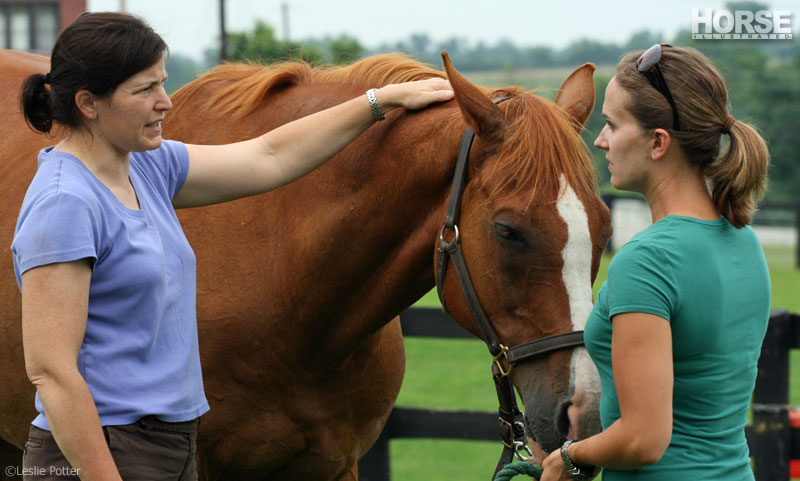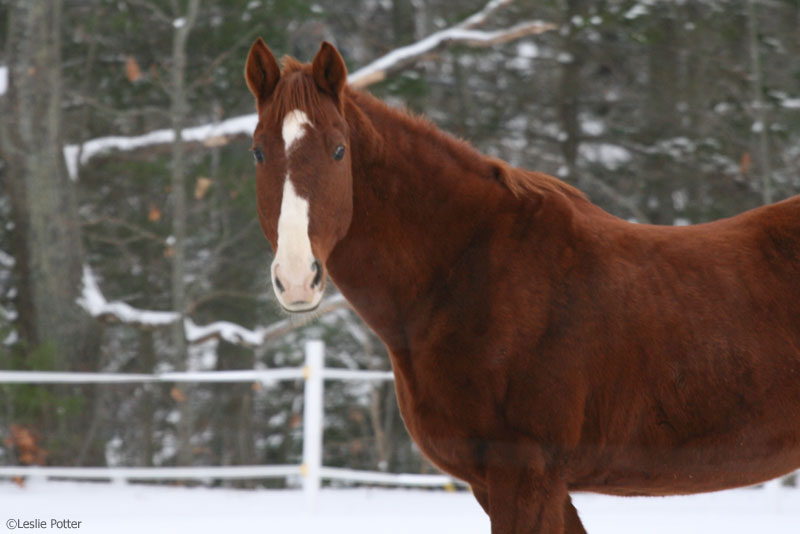Q: How do I know if my horse’s colic is a simple one that can be managed here on the farm or if he needs to be taken to a hospital for surgery? I’ve heard that the sooner horses get to surgery the better, so I don’t want to wait too long.

Be sure to contact your vet as soon as you notice signs of colic in your horse. Photo by Leslie Potter
A: You are absolutely correct that early recognition of colic signs and early referral to a hospital significantly increase a horse’s chances of survival. Your role is recognizing the signs of colic in your horse and contacting your veterinarian immediately. Your vet’s role is assessing the situation and advising if medical care is appropriate or surgery is necessary.
How does your vet know when a colic is medical and can be treated conservatively at home vs. when a colic is surgical and must be referred to a facility that can perform emergency abdominal surgery? Once your vet arrives at the farm, everything he or she does – ask questions about the recent history, perform an examination that may include nasogastric (nose-to-stomach) intubation and rectal palpation, begin treatment – provides clues as to the nature of this episode.
Once your vet arrives at the farm, everything he or she does provides clues as to the nature of this episode.
For example, if your horse’s medical history includes colic surgery a year ago, then there’s a possibility he has “adhesions,” a complication of a previous abdominal surgery where sections of bowel can stick to other sections of bowel, the body wall, or other organs, and may require a second surgery to correct.
Example number 2: during the exam, if a large amount of gas, liquid, or feed “reflux” comes up out of the tube in your horse’s stomach, then this could indicate a blockage in the bowel that may require surgery to correct (rectal palpation is also used to detect blockages including impactions, displacements, and twists).
A third example is if your vet gives your horse medication for pain as part of treatment but the pain persists or immediately returns. This sign of colic could also indicate that surgery is necessary.
On the other hand, if the history includes recent turnout onto lush spring grass, then your vet will be leaning towards a simple gas colic as a diagnosis. If the heart rate is low (in the normal range of 28 to 42 beats per minute) and the gums are moist and pink during the examination, your horse’s cardiovascular status is good and his pain levels are likely low. And if one dose of a pain-killer has him asking for food, passing manure, and looking to play with his buddies, chances are that the episode has passed.
Basically:
- if there are signs of complete or partial obstruction of the bowel,
- if there is persistent or severe abdominal pain,
- if your horse appears to be going into circulatory shock, or
- if there is a lack of response to medical treatment in general, your vet may suggest immediate referral to an equine hospital for further workup, additional medical support, or emergency abdominal surgery.






my horse is about 14 years old and yesterday she started to colic really bad so i walked her i started about 10 am and i got her felling a little better but i put her in her stall about 8 pm i filled up her water and when i walked away the layed down. I walked out to her stall this morning and she wasn’t laying down but she looked worse she looked tired and like she felt worse and her nose was really cols. I was wondering what to do and how to deal with it im really scared for her health i was wondering what would be the best thing to do for her to make her feel better.
still need help on what to do